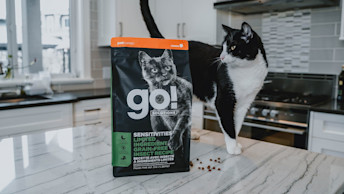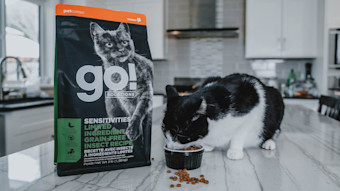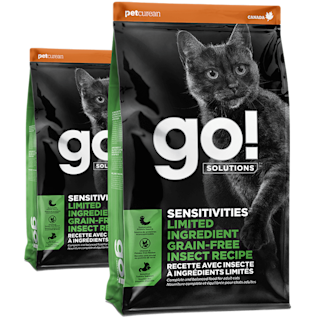October 8, 2025
Can Cats Eat Bugs?

If you’ve ever caught your cat chasing a fly or batting around a cricket, you’ve probably wondered: can cats eat bugs? The short answer is yes—most of the time, cats can safely snack on insects. In fact, cats in the wild often hunt and eat bugs as part of their natural behavior. But like most things, there are some important details to know before you let your feline friend crunch away.
In this guide, we’ll explore:
Do cats naturally eat insects?
Which bugs are safe (and which to avoid)
Can cats eat crickets?
Why insect protein is becoming a sustainable, allergy-friendly option in cat food
Do Cats Eat Insects?
Cats are natural hunters, and insects often trigger their prey drive. From moths fluttering around a lightbulb to the occasional beetle wandering across the floor, bugs can be irresistible to curious cats.
Most of the time, when your cat pounces on a bug, it’s more about play than nutrition. Still, cats will sometimes eat what they catch, and insects can provide a good source of protein, fat and insoluble fiber in the form of chitin.
Most of the time, when your cat pounces on a bug, it’s more about play than nutrition. Still, cats will sometimes eat what they catch, and insects can provide a good source of protein, fat and insoluble fiber in the form of chitin.
Can Cats Eat Bugs Safely?
Here’s where things get a bit more complicated. While many insects are harmless, some can irritate your cat’s stomach—or worse, be toxic.
Safe bugs for cats to eat:
Crickets – A great source of protein and amino acids.
Mealworms – Sometimes used in reptile food, safe in small amounts.
Houseflies & moths – Not toxic, but may upset the stomach if eaten often.
Bugs to avoid:
Bees, wasps, and ants – Stings or bites can be dangerous.
Spiders – Some species are poisonous and can cause serious illness.
Fireflies – Highly toxic to pets.
Roaches – Not toxic themselves, but can carry parasites and pesticides.
If your cat eats a bug and shows signs of vomiting, drooling, or lethargy, it’s best to contact your vet.
Can Cats Eat Crickets?
Yes—cats can eat crickets, and these little insects are surprisingly nutritious. Crickets are high in protein, contain essential amino acids, and even provide omega fatty acids and minerals.
The sounds and quick movements of crickets spark a cat's natural prey drive, and can be safe if your house-sized natural hunter is successful at catching one.
The New Bug on the Block: Black Soldier Fly Larvae
An insect protein that’s gaining a lot of attention in pet food is black soldier fly larvae. These tiny grubs are highly nutritious and officially recognized by Association of American Feed Control Officials (AAFCO) as a safe ingredient for both cats and dogs.

Black soldier fly larvae are naturally rich in protein and healthy fats, making them an excellent source of energy for cats. They’re also packed with calcium, essential amino acids, and lauric acid—a fatty acid that supports overall wellness. Even better, it's highly digestible and considered hypoallergenic, novel protein source, making it suitable for cats with food allergies and sensitivities.

Recommended Solution
This hypoallergenic and sustainable bug-based protein is rich in essential nutrients with a delicious nutty flavour that's perfect for cats with sensitive stomachs.
This extremely novel and sustainable bug-based protein is rich in essential nutrients with a delicious nutty flavor that's perfect for cats with sensitive stomachs.
View recipe
Farming these larvae is also sustainable — requiring minimal land, water, and feed compared to traditional livestock, while still producing a nutrient profile that rivals more common proteins like chicken or fish. A win-win for pets and the planet!
The Bottom Line
So, can cats eat insects? Yes—most bugs are safe, and cats have been snacking on them for thousands of years. But not all insects are harmless, so it’s good to know which ones to watch out for.
When it comes to giving your cat the benefits of insect protein without the risks of rogue bug-hunting, specially formulated cat food with black soldier fly larvae is a safe, nutritious, and sustainable way to go.



